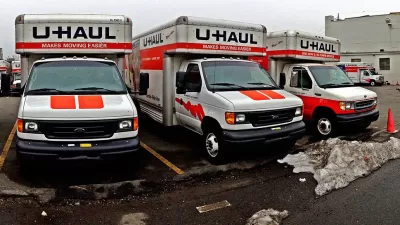Social / Demographics
Looking for Your Ideal Community? Try This New Census App
Dwellr is a new app from the Census Bureau that matches the top 25 U.S. cities and towns to your lifestyle preferences. And unlike other recent federal technology rollouts, this one seems to work pretty well.
L.A. Addresses its Growing Homeless Population by Making it Harder for Them to Eat
Forced onto the street by decreased public spending, a poor economy and congested prisons, L.A.'s homeless population surged by 27 percent last year. Tensions are growing between those trying to help and those uncomfortable with the inundation.
Traversing the Border: Planning with Transnational Communities
Transnational communities transcend borders in order to act collectively, despite geographic, economic and political challenges. A new paper examines how community-based planning is scaled up and embedded in transnational processes and relationships.

San Francisco's Crisis of Affluence
The booming tech industry has brought economic development to the Bay Area. But lavish lifestyles, astronomical housing prices, and rising evictions has put the industry in the crosshairs of a very public backlash. Can the city broker peace?
Bucking National Trend, Homelessness Rises in N.Y. and L.A.
Despite a "remarkable" drop in homelessness across the U.S., sobering new data from HUD reveals that New York City's struggle with record high homelessness is getting worse, not better. Homelessness is up substantially in Los Angeles as well.
12 Bold and Bizarre Visions for Cities
There's no shortage of bold and bizarre ideas for how to make our future cities more livable, sustainable, and efficient. Whether many of these ideas are feasible is another story.

Qatar's X-Rated Stadium and the Dangers of Designing "Readable" Buildings
With the help of Buzzfeed, Zaha Hadid's design for Qatar's new Al-Wakrah sports stadium - which happens to bear a resemblance to "lady parts" - went viral this week. Philip Kennicott examines Qatar's "awkward moment".
China Loosens One-Child Policy
The Communist Party announced on Nov. 15 two huge changes to two long-term policies that exerted enormous control over its citizens. More couples will be allowed to have additional children and "reeducation through labor camps" will be abolished.
A Call for Planning to Better Address Social Issues
Does planning possess the power to address the issues people care about? Kate Henderson, with the UK's Town and Country Planning Association, discusses the results of a year-long study into how planning can help tackle poverty and exclusion.
Where in America is Cycling Growing the Most?
Detroit is the unlikely name atop the League of American Bicyclists' new list of cities that have grown their share of bike commuters the most between 1990-2012.
An Eloquent Visualization of State-to-State Migration
Data analyst and graphics wizard Chris Walker has created a stunning interactive visualization that depicts the migration patterns between each American state in 2012.
With Bipartisan Bills, U.S. Congress Looks to Improve Bike and Pedestrian Safety
Bipartisan groups of legislators introduced identical bills in the U.S. House and Senate last week that would compel the USDOT and states to measure and improve the safety of non-motorized transportation users.
10 Ways Cities Are Turning Back Time
It's back to the future for global cities, now that we've realized what a mess the 20th century was.
Too Tired to Vote? Connecting Commute Times to Political Apathy
Have a long commute? If so, you are likely not very engaged in politics with one major exception - higher incomes can counter commuting stress. But for the rest of us, it may explain why we aren't as involved in civic issues we would like.
Technology, Talent, and Tolerance: The Creative Culture
Creativity isn’t a theory about hipsters and the latte set. The key driver of a resilient economy is the same thing that binds us as humans – our shared creativity. Hazel Borys reviews Richard Florida's latest creative culture ideas.
Could a "Broken Windows" Approach Work for Traffic Crashes?
The "Broken Windows" theory of policing - targeting minor crimes to reduce major ones - has been credited with helping to bring down violent crime rates in several cities. Could such an approach reduce traffic violence?
Are Diverse Communities Discordant With Cohesive Ones?
A study utilizing simulations of more than 20 million virtual “neighborhoods” finds a negative relationship between cohesion and diversity. The findings could alter how we understand and build social capital within neighborhoods and across cities.
Are Older Residents Being Excluded from D.C.'s Revitalization?
There seems to be one common thread linking Washington D.C.'s new bars, restaurants, boutiques, and homes: they're all oriented to appeal to younger residents. Tara Bahrampour looks at D.C.'s struggles to build a multi-generational city.

Why Aren't Americans Moving?
Four years after the Great Recession technically ended, the rate at which Americans are choosing to relocate continues to decline and is now at historic lows. What is causing this long-term trend?
Market on Wheels Serves Chicago's Food Deserts
A nonprofit has converted a former Chicago city bus into a mobile grocery store to bring fresh food to the city's underserved neighborhoods. After stopping operations in August, the service will return with a sustainable business plan this month.
Pagination
Urban Design for Planners 1: Software Tools
This six-course series explores essential urban design concepts using open source software and equips planners with the tools they need to participate fully in the urban design process.
Planning for Universal Design
Learn the tools for implementing Universal Design in planning regulations.
Gallatin County Department of Planning & Community Development
Heyer Gruel & Associates PA
JM Goldson LLC
City of Camden Redevelopment Agency
City of Astoria
Transportation Research & Education Center (TREC) at Portland State University
Jefferson Parish Government
Camden Redevelopment Agency
City of Claremont


































